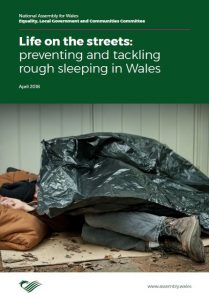The Equality, Local Government and Communities Committee has published its report – Life on the Streets: Tackling and Preventing Rough Sleeping in Wales.
As part of the Inquiry, the Committee undertook visits to projects supporting rough sleepers in Cardiff and Newport, as well as taking evidence from local authorities, academics, the police, and service providers.
The report makes 29 recommendations to the Welsh Government.
Life on the Streets: Tackling and Preventing Rough Sleeping in Wales
The Committee’s report deals with various issues, such as:
The effectiveness of the Housing (Wales) Act 2014 – the Committee concluded that the Act has had a positive impact on the prevention of homelessness, but has failed to have the same effect on the prevention of rough sleeping. As such, the Committee made various recommendations to amend legislation and guidance, including to:
- Make rough sleepers a priority need category, with the ultimate aim of abolishing priority need entirely;
- If the Welsh Government does not wish to abolish priority need, to:
-
-
- reinstate priority need for prison leavers; and
- amend the definition of ‘vulnerable’.
-
The scale of rough sleeping in Wales
The latest statistics show an increase of 10-33% in rough sleeping in Wales between 2016 and 2017. The Committee recognised the limitations of the current data gathering methods, and welcomed the development of the Street Homeless Information Network (SHIN) project as a means of improving the accuracy of the data available.
Causes of rough sleeping
The causes of rough sleeping fall into two categories:
- Structural causes, such as welfare reform and a lack of affordable housing; and
- Personal issues and experiences, such as mental health issues, substance misuse issues and Adverse Childhood Experiences (ACEs).
The Committee decided to concentrate their recommendations on two of the structural causes of rough sleeping – welfare reform and a lack of affordable housing – recommending that:
- The Welsh Government considers seeking powers over the administration of Universal Credit akin to those available to the Scottish Government;
- The Welsh Government works with local authorities and Registered Social Landlords to establish the reasons for the comparatively low level of social housing allocations to homeless households, and takes steps to maximise the number of homeless households who are allocated social housing; and
- The Welsh Government sets out more clearly the steps it will take to improve access to the Private Rented Sector for rough sleepers in its Rough Sleeping Action Plan.
Effectiveness and availability of services, including emergency accommodation
Services are offered to rough sleepers to varying degrees across the country, these include:
Emergency accommodation – the Committee was concerned that emergency accommodation is being used to house individuals in the longer-term, because of difficulties in accessing move-on accommodation, a shortage of affordable social housing, and barriers to accessing private rented accommodation.
Mental health and substance misuse services – the Committee was concerned about the barriers experienced in accessing mental health services and substance misuse services and treatment programmes. Delays in accessing such treatment can be a barrier to tackling rough sleeping.
Steps to prevent and tackle rough sleeping
The Committee made various recommendations about the Welsh Government’s recently published Rough Sleeping Action Plan, including that:
- it sets out more clearly who will be responsible for taking forward each action, and the outcomes expected against actions, and how these will be measured and monitored; and
- responsibility for the implementation of the Rough Sleeping Action Plan should be shared jointly between the Minister for Housing and Regeneration and the Cabinet Secretary for Health and Social Care.
The report also discusses, and makes recommendations, about issues such as:
- Housing First – the Committee recommends that the Welsh Government considers strengthening the Housing First – National Principles and Guidance for Wales to set out an expectation that local authorities should offer Housing First as a default approach to rough sleepers;
- Assertive outreach – the Committee recommends that the Welsh Government works with its partners to identify best practice models to deliver assertive outreach support;
- Enforcement – the Committee recommends that the Welsh Government makes representations to the Police and Crime Commissioners in Wales with a view to encouraging all police forces in Wales to ensure that officers make use of body worn cameras when interacting with rough sleepers; and
- Diverted giving schemes – the Committee recommends that the Welsh Government considers undertaking work to assess the merits of diverted giving schemes and to identify best practice in this area.
Funding
The report explains the Committee’s concerns about the funding of services for rough sleepers. The Welsh Government has offered some degree of protection to the Supporting People Programme Grant (SPPG) budget to date, but this may change with its proposal to merge the SPPG with other housing and non-housing grants. From 2018-19 seven pathfinder local authorities have been given full flexibility on how they allocate a range of grant schemes, as a pilot project, prior to any possible merger of Welsh Government grants. The Committee recommends that:
- The Welsh Government sets a timeline for publishing the findings of its Flexible Funding Pathfinders, and its decision on the proposal to merge the Supporting People Programme Grant with other housing and non-housing related grants; and
- If the findings of the Flexible Funding Pathfinders show a reduction in funding for the Supported People Programme, or cast doubt on the sector’s ability to maintain service delivery at existing levels, the Supporting People Programme Grant should remain a separate, ring-fenced grant.
The Committee’s report and recommendations will now be submitted to the Welsh Government for its consideration. A response is expected from the Government within the coming months.
Article by Megan Jones, National Assembly for Wales Research Service







